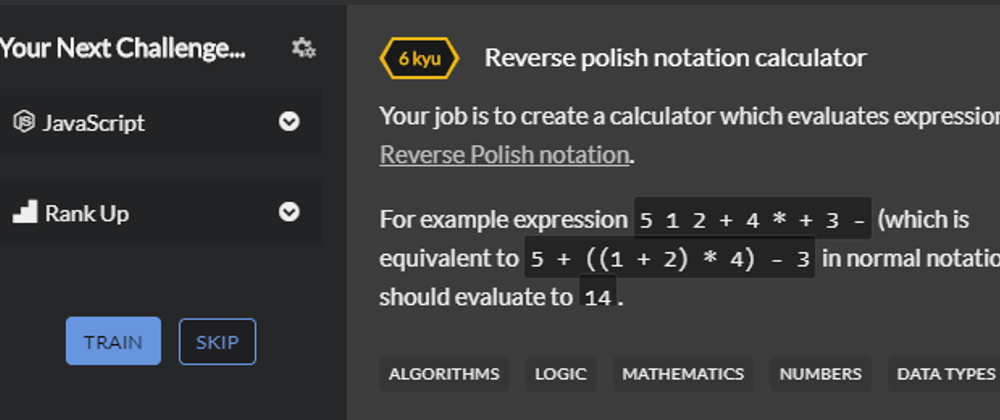In this posts, we are going to solve a CodeWars JavaScript Challenge where we will see how to evaluate a Reverse Polish Notation expression.
Github Repo: https://github.com/subinedge/Weekly-algorithm-for-blog
Have a look at my new front end dev blog: javascriptwillrule.com
What is Reverse Polish Notation?
Before going into the Reverse Polish Notation, we have to first look into Polish notation and the types of it to understand the difference clearly.
Polish notation is a way of expressing arithmetic expressions. Its most basic distinguishing feature is that operators are placed on the left of their operands.
There are 3 types of polish notation:
Infix notation (operators come in between operands like normal usage)
Prefix notation (operators come before operands)
Postfix notation (operators are placed on the left of their operands)
This is how reverse polish notation aka Postfix notation look like:
3 4 + 5 *
==> equivalent to (3+4) * 5 = 35
Sample testcase 1:
3 4 + 2 * 1 +
==> equivalent to (3+4) * 2 + 1 = 15
Sample testcase 2:
3 4 5 × −
==> equivalent to 3 - (4 * 5) = -17
Before moving into CODEWARS Challenge, there are few assumptions to be noted:
Assumption 1:
For your convenience, the input is formatted such that a space is provided between every token.
Assumption 2:
Empty expression should evaluate to 0.
Assumption 3:
Valid operations are +, -, *, /.
Assumption 4:
You may assume that there won't be exceptional situations (like stack underflow or division by zero).
CODEWARS CHALLENGE
Your Job is to create a calculator which evaluates expressions in Reverse Polish notation.
For Example, 5 1 2 + 4 * + 3 - (which is equivalent to 5 + ((1 + 2) * 4) - 3 in normal notation) should evaluate to 14.
Steps for solving this problem
Format the input expression and create an empty array to add those numbers
Check for expression is empty or not before looping through.
Loop through expression and push the numbers to stack array. Once we are out of numbers, that means we have stepped up on operators, hence pop out the last two numbers and perform corresponding operations
Add the result to stack again.
If the stack has more than one number and we are out of operators, we return "ERROR" to the console, else return the result to console
Create a reverse_polish.js file where we will incorporate our logic.
I am using CODE RUNNER VSCode extension which will compile JS code with just one click rather than writing node reverse_polish.js everytime to compile.
Format the input expression and create an empty array to add those numbers
As said in the assumptions section, for our convenience space has been added in between the operands and operators. We will trim them down. And also create a new empty stack array used for push and pop out numbers.
function reversePolish(newExpr) {
let expr = newExpr.split(" ");
let stack =[];
}
console.log(reversePolish('1 3 5 * -'));
Check for expression is empty or not before looping through.
We will check if the expression is empty or not using strict equality operator and return 0 if it does. Finish, that's all. No digging in.
So far our code looks like this:
function reversePolish(newExpr) {
let expr = newExpr.split(" ");
let stack =[];
if(expr === ''){
return 0;
}
}
console.log(reversePolish('1 3 5 * -'));
Loop through expression and push the numbers to stack array. Once we are out of numbers, that means we have stepped up on operators, hence pop out the last two numbers and perform corresponding operations
Before looping through expression, we will validate if the input provided is a number and also check for if its finite. And if it is, then add those to array.
function reversePolish(newExpr) {
let expr = newExpr.split(" ");
let stack =[];
if(expr === ''){
return 0;
}
for(let i=0; i<expr.length; i++) {
if(!isNaN(expr[i]) && isFinite(expr[i])) {
stack.push(expr[i]);
}
}
console.log(reversePolish('1 3 5 * -'));
So we will console log the stack to see the numbers are added to the stack correctly.
>>> [ '1', '3', '5' ]
Perfect! Now the else part will be executed, because we are out of numbers. We will pop out the last two numbers added.
function reversePolish(newExpr) {
let expr = newExpr.split(" ");
let stack =[];
if(expr === ''){
return 0;
}
for(let i=0; i<expr.length; i++) {
if(!isNaN(expr[i]) && isFinite(expr[i])) {
stack.push(expr[i]);
} else {
let a = stack.pop();
let b = stack.pop();
}
}
console.log(reversePolish('1 3 5 * -'));
Now chain of nested if statements will be executed to check for operator. This can also be done through switch case statements, i prefer nestedIF conditional statements. Don't forget to convert before addition, as it is passed as a string into the function. Push it to the stack once operation is done.
function reversePolish(newExpr) {
let expr = newExpr.split(" ");
let stack =[];
if(expr === ''){
return 0;
}
for(let i=0; i<expr.length; i++) {
if(!isNaN(expr[i]) && isFinite(expr[i])) {
stack.push(expr[i]);
} else {
let a = stack.pop();
let b = stack.pop();
if(expr[i] === "+") {
stack.push(parseInt(a) + parseInt(b));
} else if(expr[i] === "-") {
stack.push(parseInt(b) - parseInt(a));
} else if(expr[i] === "*") {
stack.push(parseInt(a) * parseInt(b));
} else if(expr[i] === "/") {
stack.push(parseInt(b) / parseInt(a));
} else if(expr[i] === "^") {
stack.push(Math.pow(parseInt(b), parseInt(a)));
}
}
}
}
console.log(reversePolish('1 3 5 * -'));
Add the result to stack again.
So according to the above steps first 3 and 5 would have been popped out from stack and the multiplication opeartion would have been completed. Let's confirm it by console logging at that point.
else if(expr[i] === "*") {
stack.push(parseInt(a) * parseInt(b));
console.log(stack);
}
LOG
>>> [ '1', 15 ]
Perfect! The result is pushed to the stack array. Now the leftover is '-' operation and the same procedure will be followed.
If the stack has more than one number and we are out of operators, we return "ERROR" to the console, else return the result to console
This should be after the for loop.
if(stack.length > 1) {
return "ERROR";
}else {
return stack[0];
}
Final Code:
function reversePolish(newExpr) {
let expr = newExpr.split(" ");
let stack =[];
if(expr === ''){
return 0;
}
for(let i=0; i<expr.length; i++) {
if(!isNaN(expr[i]) && isFinite(expr[i])) {
stack.push(expr[i]);
}else {
let a = stack.pop();
let b = stack.pop();
if(expr[i] === "+") {
stack.push(parseInt(a) + parseInt(b));
} else if(expr[i] === "-") {
stack.push(parseInt(b) - parseInt(a));
} else if(expr[i] === "*") {
stack.push(parseInt(a) * parseInt(b));
} else if(expr[i] === "/") {
stack.push(parseInt(b) / parseInt(a));
} else if(expr[i] === "^") {
stack.push(Math.pow(parseInt(b), parseInt(a)));
}
}
}
if(stack.length > 1) {
return "ERROR";
}else {
return stack[0];
}
}
console.log(reversePolish('1 3 5 * -')); // Result: -14






Top comments (3)
Nice,
Look at this implementation I found on Dev to
You can test it here : RPN
Next challenge is probably, how to transform BEDMAS into RPN.
actually, the problem here is - there is no priority in operations. I mean if I pass + * operations will yet plus then multiply, but we need multiply first